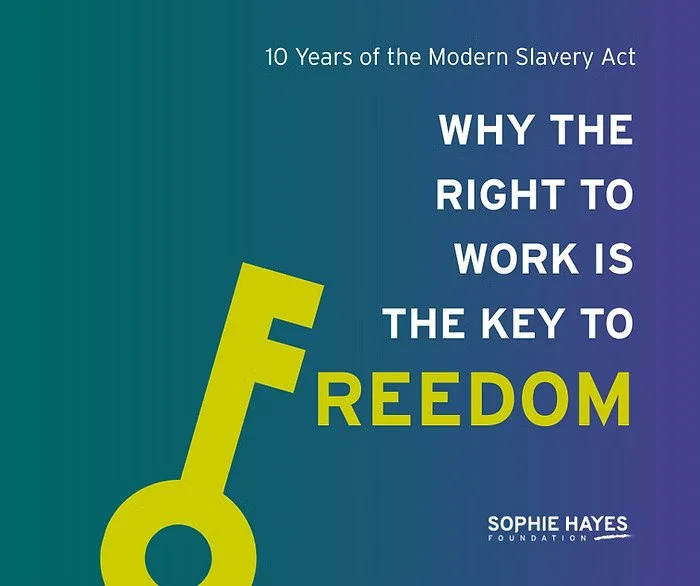10 Years of the Modern Slavery Act: Why the Right to Work is the Key to Freedom
As we reflect on the 10th anniversary of the Modern Slavery Act 2015, while progress has been made, much more needs to be done, especially when it comes to supporting survivors in the long term. Over the past few weeks, there have been significant discussions about how the Act has evolved, and what changes are necessary to ensure a future where survivors can truly rebuild their lives. While the Act set a strong foundation for tackling human trafficking and exploitation, many survivors still face barriers to independence. At Sophie Hayes Foundation, we are continuing to advocate for the Right to Work for survivors of modern slavery.
The Need for Long-Term Support and Employment Opportunities
In the parliamentary debate on March 27th, we were grateful to see MPs emphasising the importance of long-term, tailored support for survivors. This includes not just emergency accommodation and basic needs, but comprehensive services that help survivors integrate into society. We continue to emphasise that employment is a crucial part of this recovery process, allowing survivors to rebuild their lives with dignity and purpose.
Survivor Leadership and Involvement in Policymaking
We were also grateful to see the need for greater involvement of lived experience experts in policymaking emphasised in the debate. Survivors themselves are the best experts on what works and what doesn’t when it comes to support and recovery and their voices must be embedded at every level of work to ensure that policies are effective. In its session on 25th March, 10 years on is the Modern Slavery Act still fit for purpose?, the Home Affairs Select Committee echoed these concerns. They called for more survivor-led policies and stronger mechanisms to ensure that survivors are at the centre of all policies.
The Right to Work for Survivors in the NRM
On 28th March, the House of Lords debated the Modern Slavery Act 2015 Committee Report. We were delighted to see one of the recommendations made around the urgent need to grant the Right to Work to survivors within the NRM. The committee recognised that placing survivors in situations where they cannot work only increases their vulnerability to further exploitation. Without the Right to Work, survivors are left in a precarious position, dependent on limited government support, which makes it harder for them to regain their independence.
Looking Ahead: The Home Office Action Plan
The Home Office has also published its Action Plan on Modern Slavery, setting out their plan for the next 12 months. We are grateful to see a strong emphasis on survivor engagement within the Action Plan and some other promising actions such as the introduction of the Fair Work Agency, however we ultimately would like to see the Right to Work for survivors in the NRM central to discussions on work and employment.
It’s clear that while progress has been made since the passing of the Modern Slavery Act, we must continue to evolve. We will continue to advocate for the Right to Work for survivors as it is key to unlocking freedom, financial independence, and a future free from exploitation for survivors.

